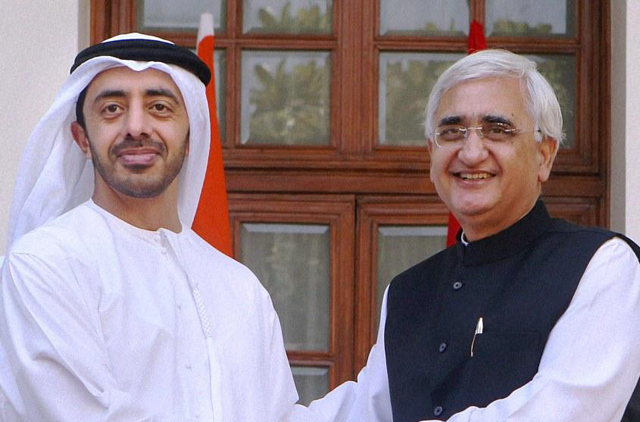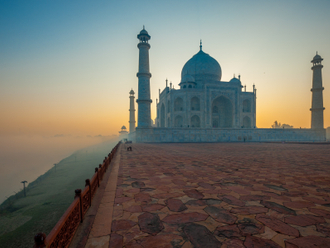Last month, UAE Foreign Minister Shaikh Abdullah Bin Zayed Al Nahyan met with Salman Khurshid, the Indian Minister of External Affairs, in India, where the key focus of the talks was on enhancing bilateral relations and helping regain investor confidence.
Against this backdrop was signed a crucial investment protection agreement, the Bilateral Investment Promotion and Protection Agreement (BIPPA), that is expected to result in the UAE investing $2 billion (Dh7.34 billion) in Indian infrastructure projects.
The close ties between the two nations as well as the strong bilateral trade is a well-known fact, but the time has come to further strengthen the relationship and take it to the next level, which both sides are hoping BIPPA will help facilitate. The UAE and India are each other’s largest trading partners with trade totalling more than $75 billion, and UAE investments in India exceeding just more than $3 billion, while India is Dubai’s top trade partner in non-oil foreign trade with volume, for the first nine months of 2013, reaching Dh111 billion.
Adeeb Ahamed, CEO of Lulu Exchange, says, “BIPPA will redefine the investment and trade cooperation between India and the UAE as it enhances the investor confidence and ensures protection of bilateral investments.”
Investment boost
With BIPPA accord now signed, the already successful two-way trade will get an additional shot in the arm. The accord would encourage new cross-border investments across a range of sectors and speedy resolution of issues associated with existing investments, adds Ahamed.
The signing of this agreement has been a long-awaited move as in the past couple of years the UAE was increasingly concerned about its investments in India, especially after telecom major Etisalat was embroiled in legal disputes.
With this key investment protection treaty having been inked recently, India is optimistic that it will be able to help restore investor confidence in the UAE, which is its tenth-largest investor in terms of FDI.
Kamal Vachani, Group Director, Al Maya Group, says, “In my opinion, it’s a landmark agreement that will significantly boost investments in Indian infrastructure projects by the UAE.
While the UAE’s investments in India have been just more than $3 billion, investments made by Indians in the Emirates are estimated to be more than $55 billion.”
Ports and infrastructure
In the pipeline is the Abu Dhabi National Energy Company (Taqa) looking at an investment of $700 million in the power sector, while DP World Operations, a leader in international marine terminal operations, is hoping to expand its presence in the Indian port sector.
India is also seeking UAE investments in greenfield projects in the infrastructure sector, which will need $1 trillion in investments over the next five years, half of which is expected to be raised from the private sector or foreign investors. India is betting big on foreign resources to finance the current account deficit, which had widened to a record high of 6.7 per cent in October-December quarter of 2012-13.
“There is tremendous potential for FDI in India and particularly from the UAE. And India dearly requires the critical FDI flow to achieve GDP growth of 8-10 per cent,” says Paras Shahdadpuri, President, The Indian Business and Professional Council (IBPC), Dubai. “What the Indian government needs to do is create an investment-friendly environment and facilitate coordination among various central, state, and local bodies, especially the Ministry of Environment that has become a new stumbling block.”
The government of India should create a one-window clearance process or bring various departments under one umbrella as investments of billions of dollars are waiting in the wings, adds Shahdadpuri. With more than 25 million NRIs and PIOs who are cash rich, the government needs to come up with smart ways, such as an infrastructure fund at a higher interest rate, to attract this pool.
Smooth operations
If on the one hand, investors are looking towards the Indian government for greater clarity on policy matters, on the other, the Indian diaspora in the UAE has always applauded the country’s policies that have created such an investor-friendly environment. Today, India ranks first among Dubai’s total non-oil foreign trade partners with trade volumes worth $30.22 billion, followed by China and the US.
“The UAE has been commended for its steps to ensure ease of doing business and it ranks 19th out of 148 countries in the World Economic Forum’s Competitiveness Index,” says Vishesh Bhatia, CEO, Jumbo Group.
“This has added further impetus to the non-oil sector and SMEs, and has helped open up several avenues for growth across multiple industries. There is also the added flexibility offered by on shore, offshore or free zone business set up to suit various business requirements. There are more than 38 free zones operating in the UAE, focusing on specific industry categories and offering benefits such as 100 per cent foreign ownership, tax exemptions, repatriation of capital and profits, and additional support services.”
With all these business opportunities, the relationship between the two nations can only get stronger in the years to come.
Get to know your new ambassador to the UAE
T. P. Seetharam, Ambassador of India to the UAE, began work last month. He has previously served as the Indian High Commissioner to Mauritius and handled India’s bilateral relations with countries in Europe as well as the European Union in New Delhi as Additional Secretary, West Europe and as Joint Secretary Central Europe.
At the Permanent Mission of India in Geneva, he was Minister (Disarmament) dealing with Conference on Disarmament and has worked as Deputy Chief of Mission in Bangkok and dealt with UN Economic and Social Commission for Asia and the Pacific (UNESCAP). He also served at the Indian Embassy in Phnom Penh and was Press Secretary to the former President of India, K.R. Narayanan.
The ambassador has considerable experience in southern Africa, having worked in Lusaka, Zambia, and having helped open Indian offices in Windhoek, Namibia, as well as in Johannesburg and Cape Town in South Africa. Fluent in Mandarin, he was Director General of India — Taipei Association, and has worked in the Indian Embassy in Beijing and Indian Commission in Hong Kong.
Born in Kerala, Seetharam is married and has a son named Navneeth and a daughter Devi.
India’s Consul General in Dubai
“I am truly impressed with the UAE and the short time in which it has transformed itself into a dynamic economy. The people are very friendly and I have received a warm welcome,” says Anurag Bhushan, Consul General of India, for whom this is his first tenure in the Middle East.
His overseas assignments have included political, information and cultural work in Tokyo; economic, commercial, visa and administration responsibilities in Dhaka; and as head of the political and administration wings in the Indian Embassy in Berlin.
Bhushan believes it is a tremendous responsibility to be the Consul General of India in Dubai. “The UAE is India’s largest trading partner. We have excellent bilateral relations. It would be my endeavour to contribute to furthering of trade and commerce between Dubai and northern emirates and India. The gulf has a large Indian community. Looking after the welfare of the community would be a very important aspect of my job here,” says Bhushan.
But it’s not all work and no play at the Consulate. “I love sports, especially playing tennis and swimming as well as an occasional round of golf. I am an avid reader and love travelling and exploring new places,” he adds.
His wife is also in the Indian Foreign Service and is presently Joint Secretary at the headquarters of Ministry of External Affairs, New Delhi. They have a son and daughter.







